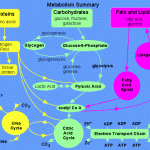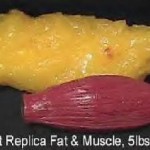The next few posts on this blog will be all about giving you a solid understanding of what your metabolism is, what affects it and how you can make it work for you.
The information here will give you a better working knowledge of those parts of your metabolism that you exert some direct control over, those you can exert some indirect control over and those you just have to live with!
If you have ever felt like you’re fighting a losing battle to shed pounds, in a sense you are.
Metabolism is NOT just about energy in versus energy out.
In our primitive past our bodies evolved so that we could store energy as fat in times of plenty (feasting) so that we are able to survive in times of scarcity. In these modern times we feast and then feast again without ever really enduring times of scarcity where food becomes rare and starvation looks likely. So this survival mechanism keeps storing energy as fat against hard times that frankly most modern humankind will never experience.
That creates problems for us because our bodies are basically fat storage machines. Very efficient ones.
The Body Shape Shifters philosophy is based around the idea of reconditioning your metabolism through a strategic mix of exercise, diet and hormone manipulation. A high metabolic rate means that we use the nutrients from our food more efficiently, maintain healthy body composition (lower fat and higher muscle levels) longer, feel better, think clearer and live healthier lives overall
What is Metabolism?
Beginning with birth and ending at death, our body receives the energy it needs to fuel itself through the processes of metabolism.
Metabolism is an umbrella term that covers the non-stop chemical processes that operate to keep our bodies functioning. Your Metabolism is primarily 2 things:
1) The rate at which your body uses energy to support all of the basic functions that are essential to sustain your life,
2) Plus all of the energy requirements for needed for additional activity and digestive processes.
Think of it this way – just being alive requires energy so when we talk about Metabolism it includes standing, sitting, sleeping, running, jumping, breathing, eating, digesting, having a beating heart, growing new cells, hair, skin, muscle and bone. So when we talk about our metabolic rate we are talking about the rate at which our bodies are burning the calories / kilojoules we have stored and that we get from food.
Your metabolism burns calories / kilojoules all the time, whether you’re just sitting on the couch or you’re jogging around the block. Even while we sleep our metabolism is working.
Every process that takes place in our body ultimately gets the energy to do so from the food we eat. The food we eat is broadly made up of Carbohydrates, Fats or Proteins with some micronutrients in the form of vitamins & minerals. (More detail on the effect that different nutrients have on our metabolism in later posts.) The amount of calories your body burns at any given time is regulated by your metabolism. In other words, it’s not just about burning up the food we eat, but about how the various nutrients from that food are used to help us maintain a healthy body.
There are two primary metabolic processes that take place in your body:
Catabolism – this is the breakdown of food components such as carbohydrates, proteins and fats into
their simpler forms, where they are then used to create energy which can be turned into heat or burned up by your cells. This can also mean the breakdown of body tissue like muscle in the absence of other fuel sources. Catabolism is the destructive phase of metabolism, and the critical partner to anabolism, as they rely on each other to do their specific jobs. Digestion is a catabolic process that breaks your food down into smaller particles that can then be used in anabolism.
Generally characterised as ‘bad,’ catabolism is an essential part of our metabolic processes.
Anabolism – means growth or storage so energy is stored as glycogen in the liver & muscles, in fat cells (once the glycogen stores are full) or used to help build and repair structures of the body. It is most often associated with muscle growth. Anabolism is the constructive phase of metabolism, as it produces all of the substances needed in our body for it to grow, maintain and repair itself.
These two processes are carefully monitored by our body to make sure they remain in balance. However our diet, our environment and our type & amount of daily activity can all affect them both.
Ultimately our metabolism is controlled by hormones (think chemical messages that trigger processes) and by our nervous system. Hormonal problems, our physical environment and genetic disorders can all affect our metabolism. Whilst we cannot control our metabolism per se, we can make it work for us.
Studies conducted by Spennewyn in 1990 found a number of strong correlations between lean mass and metabolism based on indirect calorimetry measurements. Spennewyn discovered that lean tissue in men and women required approximately 16 calories per pound per day. This means that once a person’s lean mass is known then it can be multiplied by 16 to reveal ball park daily caloric needs based on the activity level of the individual. This method has been used in many gyms, health clubs and dietician settings to determine daily caloric needs. It is not perfect.
Where is the energy used?
Energy expenditure for your body is roughly broken down like this:
- Liver 27%
- Brain 19%
- Heart 7%
- Kidneys 10%
- Skeletal muscle 18%
- Other organs 19%
To shift our shape by getting rid of fat we need to understand the ways & the speed with which we burn the calories from the food we eat. We cannot necessarily speed up all of your metabolic processes but we can make them more efficient.
Well that’s the basic stuff out of the way – next week we get into some terms to know and then the 4 components of your metabolism & how you can affect them for your benefit.
Be well.




